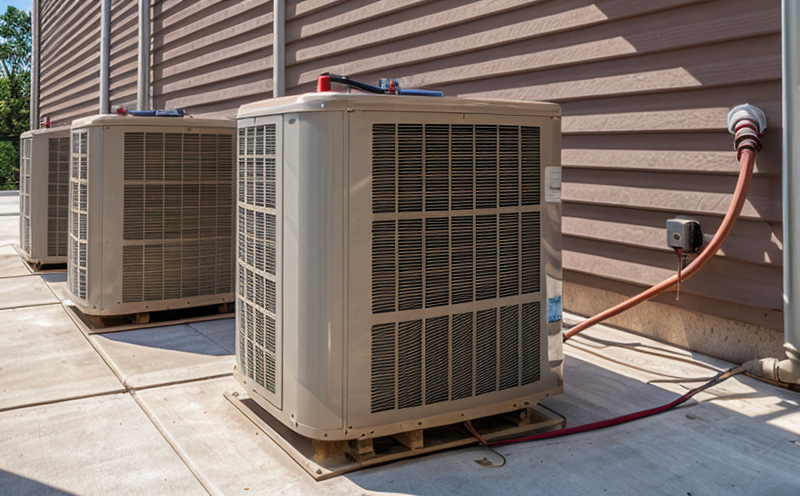ISO 13256-1 Testing of Water-Source Heat Pumps
The ISO 13256-1 standard is a critical framework for the testing and evaluation of water-source heat pumps, ensuring their reliability, efficiency, and compliance with international quality standards. This service specializes in conducting comprehensive tests on water-source heat pumps to ensure they meet the stringent requirements outlined by this international standard.
Water-source heat pumps play an essential role in sustainable heating and cooling solutions for buildings. They offer energy-efficient alternatives to traditional HVAC systems, making them a preferred choice for modern infrastructure projects. The testing process focuses on several key parameters that influence the performance of these units:
- Thermal Performance: This involves evaluating the heat pump's ability to transfer heat between water and air efficiently.
- Efficiency: Testing the coefficient of performance (COP) and seasonal energy efficiency ratio (SEER).
- Noise Levels: Ensuring that the unit operates within acceptable noise levels for residential or commercial settings.
- Reliability: Assessing the durability and longevity of the heat pump under various operating conditions.
The testing process begins with thorough preparation of the water-source heat pumps, ensuring they are in optimal condition. This includes checking all components for integrity and functionality before commencing tests. Our state-of-the-art laboratory facilities and experienced technicians ensure that each test is conducted under controlled and accurate conditions.
Upon completion of testing, we provide detailed reports that include all relevant data points, along with interpretations and recommendations for improvement where necessary. These reports are invaluable tools for quality managers, compliance officers, R&D engineers, and procurement teams responsible for selecting reliable HVAC solutions.
Scope and Methodology
The ISO 13256-1 standard defines the scope of testing for water-source heat pumps, which includes the evaluation of various performance metrics. The methodology involves a series of tests that assess the thermal efficiency, reliability, durability, and environmental impact of these units.
- Thermal Performance Testing: This test evaluates how efficiently the heat pump transfers heat between water and air.
- Efficiency Testing: Measurement of COP (Coefficient of Performance) and SEER (Seasonal Energy Efficiency Ratio).
- Noise Level Assessment: Ensuring that noise emissions are within acceptable limits for various environments.
- Reliability Testing: Assessing the longevity and durability under different operating conditions.
The testing process is conducted in a controlled environment to ensure accurate results. Our team of experts uses advanced instrumentation, including thermal imaging cameras and specialized software, to collect precise data points. This ensures that every aspect of the heat pump's performance is thoroughly evaluated.
The report generated from these tests provides comprehensive insights into the operational capabilities of water-source heat pumps. It includes detailed analyses of each test parameter along with recommendations for optimizing performance or addressing any issues identified during testing.
Industry Applications
- Residential Buildings: Ensuring that homes are equipped with efficient heating and cooling systems to enhance comfort levels while reducing energy costs.
- Commercial Properties: Supporting sustainable development by promoting the use of green technologies in large-scale projects.
- Schools & Universities: Providing reliable HVAC solutions that contribute to a healthy learning environment for students and staff.
- Hospitals & Healthcare Facilities: Ensuring consistent and efficient climate control, which is crucial for maintaining patient comfort and safety.
Water-source heat pumps are increasingly being adopted in various sectors due to their environmental benefits and cost-effectiveness. By adhering strictly to the ISO 13256-1 standard, we ensure that each system meets the highest quality standards, making it suitable for diverse applications across industries.
Environmental and Sustainability Contributions
The testing of water-source heat pumps according to ISO 13256-1 not only ensures their reliability but also contributes significantly to environmental sustainability. These units play a vital role in reducing carbon footprints by utilizing renewable energy sources for heating and cooling purposes.
By adhering to this standard, we help clients meet regulatory requirements while promoting sustainable practices within the building sector. The use of water-source heat pumps can lead to substantial reductions in greenhouse gas emissions compared to traditional HVAC systems, making them a key component in achieving global sustainability goals.





